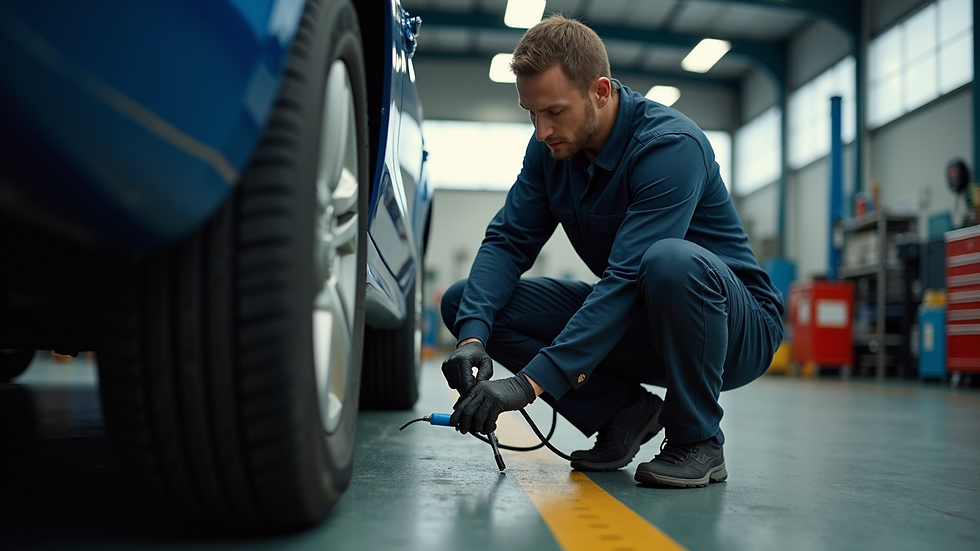The Importance of Routine Car Care for Vehicle Longevity
- thedetailmaestro
- Aug 11, 2025
- 4 min read
Taking care of your vehicle is more than just a matter of appearance. Routine car care plays a crucial role in extending the life of your car, improving safety, and maintaining its value. Regular maintenance helps prevent costly repairs and keeps your vehicle running smoothly for years to come. This article explores why consistent car care is essential and offers practical tips to help you protect your investment.
Why Routine Car Care Matters
Routine car care is the foundation of vehicle longevity. Without regular attention, small issues can quickly escalate into major problems. For example, neglecting oil changes can cause engine wear, while ignoring tire maintenance can lead to poor handling and increased fuel consumption.
Regular maintenance also ensures your car operates efficiently. A well-maintained engine uses fuel more effectively, reducing emissions and saving you money at the pump. Additionally, routine checks on brakes, lights, and other safety features help prevent accidents.
Here are some key benefits of routine car care:
Improved safety: Regular inspections catch worn brakes, faulty lights, and other hazards.
Better performance: Clean filters and fresh fluids keep your engine running smoothly.
Cost savings: Preventive maintenance avoids expensive repairs down the road.
Higher resale value: A well-maintained car retains its value better.
By following a consistent maintenance schedule, you can enjoy peace of mind knowing your vehicle is reliable and safe.

Essential Car Care Tasks to Perform Regularly
To keep your vehicle in top shape, focus on these essential car care tasks:
Oil and filter changes
Change your oil and oil filter every 3,000 to 5,000 miles or as recommended by your manufacturer. Fresh oil lubricates engine parts and prevents overheating.
Tire maintenance
Check tire pressure monthly and keep it at the recommended level. Rotate tires every 6,000 to 8,000 miles to ensure even wear. Inspect tires for damage or tread wear regularly.
Brake inspections
Have your brakes checked at least once a year or if you notice squeaking or reduced stopping power. Replace brake pads and fluid as needed.
Fluid checks
Regularly check coolant, transmission fluid, brake fluid, and windshield washer fluid. Top off or replace fluids according to your vehicle’s schedule.
Battery care
Inspect your battery terminals for corrosion and clean them if necessary. Test the battery’s charge and replace it every 3 to 5 years.
Air filter replacement
Replace the air filter every 12,000 to 15,000 miles to ensure proper airflow and engine efficiency.
Wiper blade replacement
Change wiper blades every 6 to 12 months for clear visibility during rain or snow.
By staying on top of these tasks, you can avoid breakdowns and keep your car running like new.

What does auto detailing mean?
Auto detailing is a thorough cleaning and restoration process that goes beyond a simple car wash. It involves deep cleaning, polishing, and protecting both the interior and exterior of your vehicle. Detailing helps maintain your car’s appearance and can even protect the paint and interior materials from damage.
The exterior detailing process typically includes washing, claying to remove contaminants, polishing to eliminate scratches, and applying wax or sealant for protection. Interior detailing involves vacuuming, shampooing carpets and upholstery, cleaning windows, and conditioning leather or vinyl surfaces.
Regular auto detailing not only keeps your car looking great but also preserves its value. It can prevent rust, fading, and wear caused by dirt, UV rays, and other environmental factors. For those who want professional results, an auto detail service can provide expert care and attention to every part of the vehicle.

How to Create a Routine Car Care Schedule
Creating a routine car care schedule helps you stay organized and ensures no maintenance task is overlooked. Here’s a simple way to set up your schedule:
Monthly
- Check tire pressure
- Inspect lights and signals
- Check windshield washer fluid
Every 3,000 to 5,000 miles
- Change engine oil and filter
- Inspect belts and hoses
Every 6,000 to 8,000 miles
- Rotate tires
- Check brake system
Every 12,000 to 15,000 miles
- Replace air filter
- Inspect suspension and steering components
Annually
- Test battery and replace if needed
- Flush and replace coolant
- Inspect exhaust system
- Perform a full vehicle inspection
Use a calendar or a car maintenance app to track these tasks. Keeping records of all services performed can also help when selling your vehicle, proving it has been well cared for.
Tips for Maintaining Your Vehicle Between Services
Besides scheduled maintenance, there are simple habits you can adopt to keep your car in good condition:
Wash your car regularly to remove dirt, salt, and grime that can damage paint and cause rust.
Park in shaded or covered areas to protect your car from sun damage.
Avoid harsh driving habits like rapid acceleration and hard braking, which increase wear and tear.
Listen for unusual sounds and address them promptly to prevent bigger issues.
Keep your interior clean to prevent stains and wear on upholstery.
By combining these habits with routine maintenance, you can significantly extend your vehicle’s lifespan.
Routine car care is an investment in your vehicle’s future. By following a consistent maintenance schedule and paying attention to small details, you ensure your car remains reliable, safe, and valuable for years. Whether you perform these tasks yourself or seek professional help, such as an auto detail, the effort you put into caring for your car will pay off in the long run.




Comments